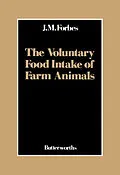The Voluntary Food Intake of Farm Animals offers a wide discussion on food intake among farm animals. The book presents various studies, facts, details, and theories that are relevant to the subject.
The first chapter begins by explaining the basic definition and significance of voluntary food intake. This topic is followed by discussions on meal patterns, the main features of eating, and the similarities between species. The next chapter explores theories about the food intake control, which are divided into two types: single-factor theories and multiple-factor theories. In Chapter 3, the discussion is on the food's pathway, including elaborations on the various receptors. Chapter 4 considers the central nervous system's involvement in the voluntary food intake and the energy balance regulation. The next couple of chapters highlight the possible reasons that affect food intake; among them are pregnancy, fattening, physical growths, and the environment. In the book's remaining chapters, the discussion revolves around grass intake and the prediction and manipulation of voluntary food intake.
The book serves as a valuable reference for undergraduates and postgraduates of biology and its related fields.
Inhalt
1 Introduction
Significance of Voluntary Food Intake
Main Features of Eating
Methods of Measuring Food Intake
Analysis of Meal Patterns
Similarities and Differences between Species
Summary
2 Review of Theories of Food Intake Control
Single-Factor Theories
Multiple-Factor Theories
Summary
3 Negative Feedback Pathways
Oropharyngeal Receptors
Mechanoreceptors in Stomach and Intestines
Chemoreceptors in Stomach and Intestines
Osmoreceptors
Liver Receptors
Temperature Receptors
Blood-Borne Factors in the General Circulation
Summary
4 Central Nervous Control
Lesioning Studies
Electrical Stimulation
Chemical Stimulation
Physiological Responses of the Brain to Feeding
Brain Temperature
Energy Status of the Brain
Summary
5 Effects of Physiological State and Animal Productivity
Growth
Fattening
Estrus
Pregnancy
Lactation
The Laying Hen
Summary
6 Dietary Factors Affecting Intake
Digestibility and Energy Concentration
Protein
Amino Acid Deficiency and Imbalance
Deficiencies and Excesses of other Dietary Constituents
Specific Appetites
Water Deprivation
Fasting
Frequency of Feeding
Sensory Factors
Water Intake
Summary
7 Environmental Factors Affecting Intake
Environmental Temperature
Photoperiod
Social Factors
Housing
Other Environmental Factors
Disease
Summary
8 Intake of Fresh and Conserved Grass
Measurement of Intake at Pasture
Herbage Intake
Conserved Forages
Summary
9 Prediction of Voluntary Intake
Pigs
Poultry
Ruminants
Summary
10 Manipulation of Voluntary Intake
Pigs
Poultry
Ruminants
Summary
References
Index
